Hãy nhập câu hỏi của bạn vào đây, nếu là tài khoản VIP, bạn sẽ được ưu tiên trả lời.


Bài 2:
\(\dfrac{12}{-24}=\dfrac{12:12}{-24:12}=\dfrac{1}{-2}\)
\(\dfrac{-39}{75}=\dfrac{-39:3}{75:3}=\dfrac{-13}{25}\)
\(\dfrac{132}{-264}=\dfrac{132:132}{-264:132}=\dfrac{1}{-2}\)
Bài 3:
\(\dfrac{1}{-2}=\dfrac{-1}{2};\dfrac{-3}{-5}=\dfrac{3}{5};\dfrac{2}{-7}=\dfrac{-2}{7}\)
Bài 4:
\(15p=\dfrac{1}{4}h;20p=\dfrac{1}{3}h;45p=\dfrac{3}{4}h;50p=\dfrac{5}{6}h\)

Bài 4:
a; \(\dfrac{1}{4}\) - \(\dfrac{1}{5}\) = \(\dfrac{5}{20}\) - \(\dfrac{4}{20}\) = \(\dfrac{1}{20}\)
b; \(\dfrac{3}{5}\) - \(\dfrac{-1}{2}\) = \(\dfrac{6}{10}\) + \(\dfrac{5}{10}\) = \(\dfrac{11}{10}\)
c; \(\dfrac{3}{5}\) - \(\dfrac{-1}{3}\) = \(\dfrac{9}{15}\) + \(\dfrac{5}{15}\) = \(\dfrac{14}{15}\)
d; \(\dfrac{-5}{7}\) - \(\dfrac{1}{3}\)= \(\dfrac{-15}{21}\) - \(\dfrac{7}{21}\)= \(\dfrac{-22}{21}\)
Bài 5
a; 1 + \(\dfrac{3}{4}\) = \(\dfrac{4}{4}\) + \(\dfrac{3}{4}\) = \(\dfrac{7}{4}\) b; 1 - \(\dfrac{1}{2}\) = \(\dfrac{2}{2}\) - \(\dfrac{1}{2}\) = \(\dfrac{1}{2}\)
c; \(\dfrac{1}{5}\) - 2 = \(\dfrac{1}{5}\) - \(\dfrac{10}{5}\) = \(\dfrac{-9}{5}\) d; -5 - \(\dfrac{1}{6}\) = \(\dfrac{-30}{6}\) - \(\dfrac{1}{6}\) = \(\dfrac{-31}{6}\)
e; - 3 - \(\dfrac{2}{7}\)= \(\dfrac{-21}{7}\) - \(\dfrac{2}{7}\)= \(\dfrac{-23}{7}\) f; - 3 + \(\dfrac{2}{5}\) = \(\dfrac{-15}{5}\) + \(\dfrac{2}{5}\)= - \(\dfrac{13}{5}\)
g; - 3 - \(\dfrac{2}{3}\) = \(\dfrac{-9}{3}\) - \(\dfrac{2}{3}\) = \(\dfrac{-11}{3}\) h; - 4 - \(\dfrac{-5}{7}\) = \(\dfrac{-28}{7}\)+ \(\dfrac{5}{7}\) = - \(\dfrac{23}{7}\)

Câu 8:
a:Sửa đề: \(4+4^2+\cdots+4^{2025}\)
Ta có: \(4+4^2+\cdots+4^{2025}\)
\(=\left(4+4^2+4^3\right)+\left(4^4+4^5+4^6\right)+\cdots+\left(4^{2023}+4^{2024}+4^{2025}\right)\)
\(=4\left(1+4+4^2\right)+4^4\left(1+4+4^2\right)+\cdots+4^{2023}\left(1+4+4^2\right)\)
\(=21\left(4+4^4+\cdots+4^{2023}\right)\) ⋮21
b: \(5+5^2+5^3+5^4+\cdots+5^{2024}\)
\(=\left(5+5^2\right)+\left(5^3+5^4\right)+\cdots+\left(5^{2023}+5^{2024}\right)\)
\(=\left(5+5^2\right)+5^2\left(5+5^2\right)+\cdots+5^{2022}\left(5+5^2\right)\)
\(=30\left(1+5^2+\cdots+5^{2022}\right)\) ⋮30
Câu 7:
a: \(A=2+2^2+2^3+\cdots+2^{99}\)
=>\(2A=2^2+2^3+\cdots+2^{100}\)
=>\(2A-A=2^2+2^3+\cdots+2^{100}-2-2^2-\cdots-2^{99}\)
=>\(A=2^{100}-2\)
b: \(B=1-7+7^2-7^3+\cdots+7^{48}-7^{49}\)
=>\(7B=7-7^2+7^3-7^4+\cdots+7^{49}-7^{50}\)
=>\(7B+B=7-7^2+7^3-7^4+\cdots+7^{49}-7^{50}+1-7+7^2-7^3+\cdots+7^{48}-7^{49}\)
=>\(8B=-7^{50}+1\)
=>\(B=\frac{-7^{50}+1}{8}\)
Câu 4:
a: \(x^3=125\)
=>\(x^3=5^3\)
=>x=5
b: \(11^{x+1}=121\)
=>\(11^{x+1}=11^2\)
=>x+1=2
=>x=2-1=1
c: \(\left(x-5\right)^3=27\)
=>\(\left(x-5\right)^3=3^3\)
=>x-5=3
=>x=3+5=8
d: \(4^5:4^{x}=16\)
=>\(4^{x}=4^5:16=4^5:4^2=4^3\)
=>x=3
e: \(5^{x-1}\cdot8=1000\)
=>\(5^{x-1}=1000:8=125=5^3\)
=>x-1=3
=>x=3+1=4
f: \(2^{x}+2^{x+3}=72\)
=>\(2^{x}+2^{x}\cdot8=72\)
=>\(2^{x}\cdot9=72\)
=>\(2^{x}=\frac{72}{9}=8=2^3\)
=>x=3
g: \(\left(3x+1\right)^3=343\)
=>\(\left(3x+1\right)^3=7^3\)
=>3x+1=7
=>3x=6
=>x=2
h: \(3^{x}+3^{x+2}=270\)
=>\(3^{x}+3^{x}\cdot9=270\)
=>\(10\cdot3^{x}=270\)
=>\(3^{x}=\frac{270}{10}=27=3^3\)
=>x=3
i: \(25^{2x+4}=125^{x+3}\)
=>\(\left(5^2\right)^{2x+4}=\left(5^3\right)^{x+3}\)
=>\(5^{4x+8}=5^{3x+9}\)
=>4x+8=3x+9
=>x=1
Câu 6:
1 giờ=3600 giây
Số tế bào hồng cầu được tạo ra sau mỗi giờ là:
\(25\cdot10^5\cdot3600=25\cdot36\cdot10^7=900\cdot10^7=9\cdot10^9\) =9 tỉ (tế bào)
câu 5:
a. \(16^{16}=\left(2^4\right)^{16}=2^{64}\)
\(64^{11}=\left(2^6\right)^{11}=2^{66}\)
vì \(2^{66}>2^{64}\) nên \(64^{11}>16^{16}\)
b. \(625^5=\left(5^4\right)^5=5^{20}\)
\(125^7=\left(5^3\right)^7=5^{21}\)
\(5^{20}<5^{21}\Rightarrow625^5<125^7\)
c. \(3^{36}=\left(3^3\right)^{12}=27^{12}\)
\(5^{24}=\left(5^2\right)^{12}=25^{12}\)
\(27^{12}>25^{12}\Rightarrow3^{36}>5^{24}\)

Bài 5:
a. Gọi $d=ƯCLN(n-2, n+1)$
$\Rightarrow n-2\vdots d; n+1\vdots d$
$\Rightarrow (n+1)-(n-2)\vdots d$
$\Rightarrow 3\vdots d\Rightarrow d\in \left\{1; 3\right\}$
Để ps tối giản thì $n-2\not\vdots 3$
$\Leftrightarrow n\neq 3k+2$ với $k$ là số tự nhiên bất kỳ.
b.
Gọi $d=ƯCLN(n+5, n-2)$
$\Rightarrow n+5\vdots d; n-2\vdots d$
$\Rightarrow (n+5)-(n-2)\vdots d$
$\Rightarrow 7\vdots d$
$\Rightarrow d\in \left\{1; 7\right\}$
Để ps tối giản thì $n-2\not\vdots 7$
$\Rightarrow n\neq 7k+2$ với $k$ là số tự nhiên bất kỳ.

Bài 1:
a; 24 ⋮ \(x\); 30 ⋮ \(x\); 48 \(⋮\) \(x\) và \(x\) lớn nhất.
vì 24 \(⋮\) \(x\); 30 ⋮ \(x\); 48 ⋮ \(x\) ⇒ \(x\) \(\in\) ƯC(24; 30; 48)
Vì \(x\) là lớn nhât nên \(x\) \(\in\) ƯCLN(24; 30; 48)
24 = 22.33; 30 = 2.3.5; 48 = 24.3
ƯCLN(24; 30; 48) = 2.3 = 6
⇒ \(x\) = 6
Vậy \(x\) = 6
b; 120 ⋮ \(x\); 180 ⋮ \(x\); 30 ⋮ \(x\)
⇒ \(x\) \(\in\) ƯC(120; 180; 390)
120 = 23.3.5; 180 = 22.32.5; 390 = 2.3.5.13
ƯC(120; 180; 390) = 2.3.5 = 30
⇒ \(x\in\) Ư(30) = {1; 2; 3; 5; 6; 10;15; 30}
Vì 5 ≤ \(x\) ≤ 15 nên \(x\) \(\in\) {5; 6; 10; 15}

Câu 8:
a:Sửa đề: \(4+4^2+\cdots+4^{2025}\)
Ta có: \(4+4^2+\cdots+4^{2025}\)
\(=\left(4+4^2+4^3\right)+\left(4^4+4^5+4^6\right)+\cdots+\left(4^{2023}+4^{2024}+4^{2025}\right)\)
\(=4\left(1+4+4^2\right)+4^4\left(1+4+4^2\right)+\cdots+4^{2023}\left(1+4+4^2\right)\)
\(=21\left(4+4^4+\cdots+4^{2023}\right)\) ⋮21
b: \(5+5^2+5^3+5^4+\cdots+5^{2024}\)
\(=\left(5+5^2\right)+\left(5^3+5^4\right)+\cdots+\left(5^{2023}+5^{2024}\right)\)
\(=\left(5+5^2\right)+5^2\left(5+5^2\right)+\cdots+5^{2022}\left(5+5^2\right)\)
\(=30\left(1+5^2+\cdots+5^{2022}\right)\) ⋮30
Câu 7:
a: \(A=2+2^2+2^3+\cdots+2^{99}\)
=>\(2A=2^2+2^3+\cdots+2^{100}\)
=>\(2A-A=2^2+2^3+\cdots+2^{100}-2-2^2-\cdots-2^{99}\)
=>\(A=2^{100}-2\)
b: \(B=1-7+7^2-7^3+\cdots+7^{48}-7^{49}\)
=>\(7B=7-7^2+7^3-7^4+\cdots+7^{49}-7^{50}\)
=>\(7B+B=7-7^2+7^3-7^4+\cdots+7^{49}-7^{50}+1-7+7^2-7^3+\cdots+7^{48}-7^{49}\)
=>\(8B=-7^{50}+1\)
=>\(B=\frac{-7^{50}+1}{8}\)
câu 4:
a) \(\)x³ = 125
x³ = 5³
⇒ x = 5
b. \(11^{x+1}=121\)
\(11^{x+1}=11^2\)
⇒ x + 1 = 2
⇒ x = 2 - 1 = 1
c. (x - 5)³ = 27
(x - 5)³ = 3³
⇒ x - 5 = 3
x = 3 + 5 = 8
d. \(4^5:4^{x}=16\)
\(4^{5-x}=4^2\)
⇒ 5 - x = 2
x = 5 - 2 = 3
e. \(5^{x-1}\cdot8=1000\)
\(5^{x-1}=1000:8\)
\(5^{x-1}=125\)
\(5^{x-1}=5^3\)
⇒ x - 1 = 3
x = 3 + 1 = 4
f. \(2^{x}+2^{x+3}=72\)
\(2^{x}\cdot\left(1+2^3\right)=72\)
\(2^{x}=72:9\)
\(2^{x}=8\)
\(2^{x}=2^3\)
⇒ x = 3
g. (3x + 1)³ = 343
(3x + 1)³ = 7³
⇒ 3x + 1 = 7
3x = 7 - 1
3x = 6
x = 6 : 3 = 2
h. \(3^{x}+3^{x+2}=270\)
\(3^{x}\cdot\left(1+3^2\right)=270\)
\(3^{x}=270:10\)
\(3^{x}=27\)
\(3^{x}=3^3\)
⇒ x = 3
i. \(25^{2x+4}=125^{x+3}\)
\(\left(5^2\right)^{2x+4}=\left(5^3\right)^{x+3}\)
\(5^{4x+8}=5^{3x+9}\)
=>4x + 8 = 3x + 9
4x - 3x = 9 - 8
x = 1



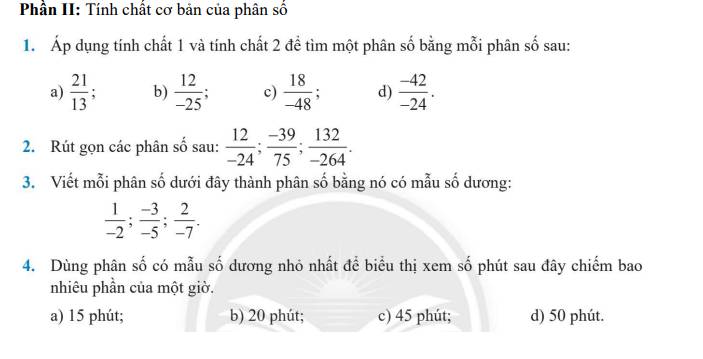
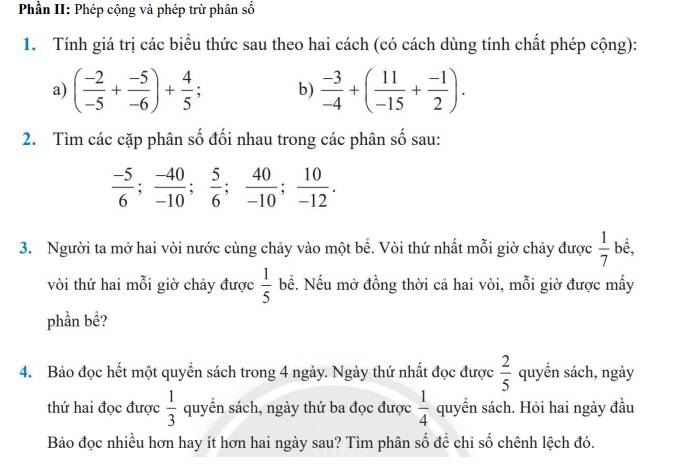
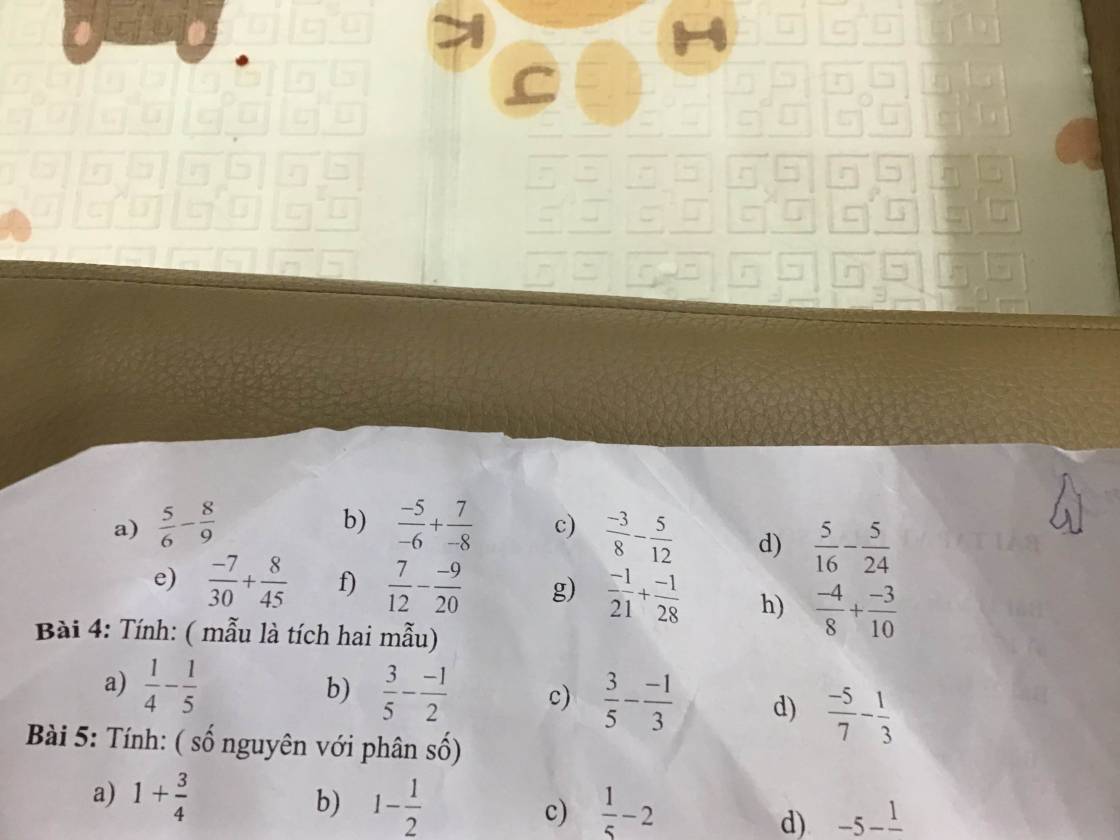
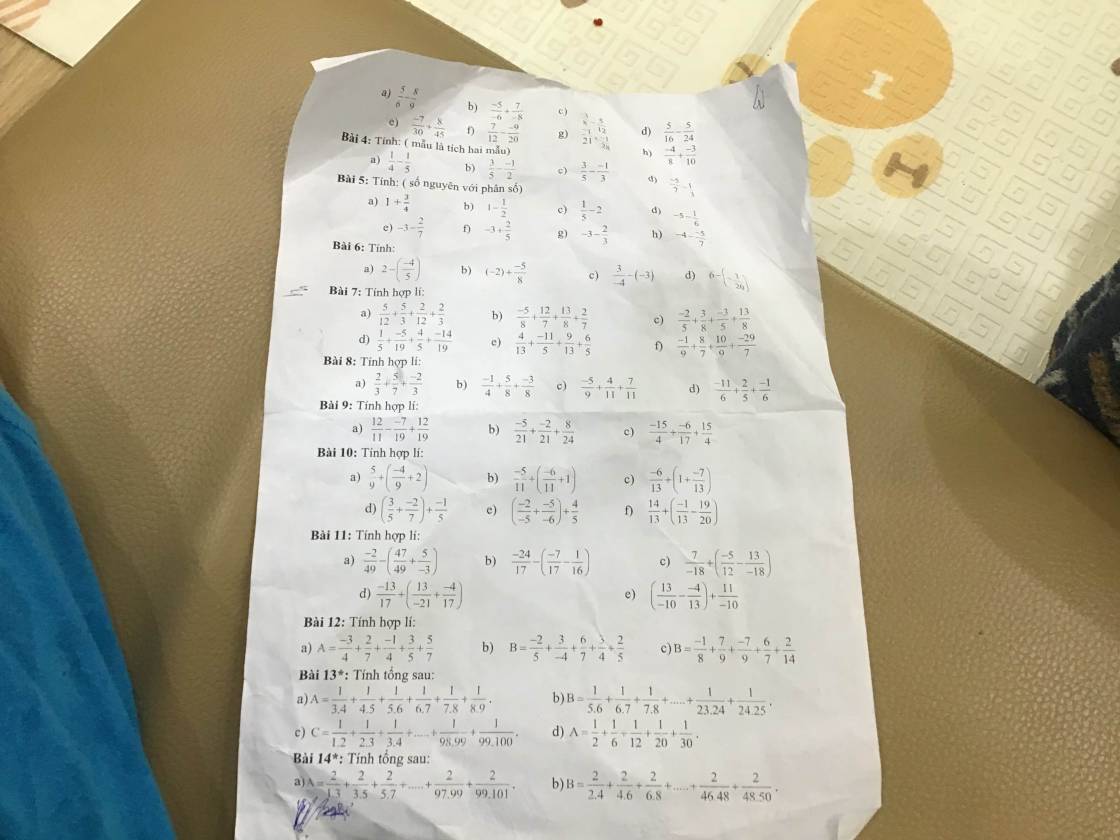


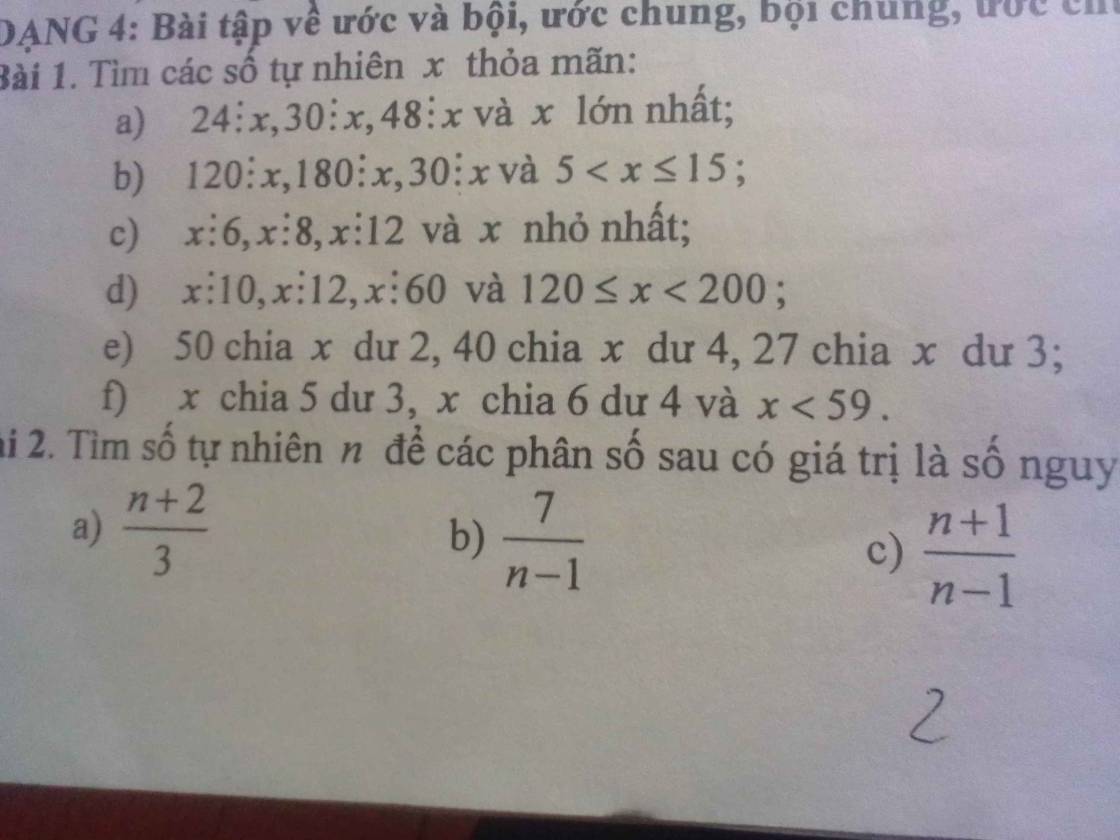

i: =20*(-29)+(-20)*111
=20(-29-111)
=-20*140=-2800
k: \(=-152\cdot125+152\cdot333-125\cdot333+125\cdot152\)
=27*333
=8991
m: \(=63\left(83+17\right)=6300\)
n: \(=126-7\cdot\left(-16\right)=126+112=238\)
p: \(=35\left(71\cdot2-7-13\right)=35\cdot122=4270\)
q: \(=18\cdot23-18\cdot17-13\cdot23-13\cdot18=5\cdot23-18\cdot30=115-540=-425\)